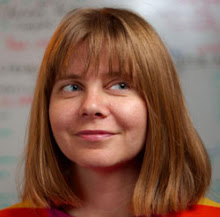 Literary critics have said for some time that Mary Shelley wrote Frankenstein as a reaction to the horrors of child birth. In a time when one out of three women died giving birth, that is really not such an irrational idea. However, I'd like to get more specific. I think she wrote Frankenstein in reaction to the horrors of raising a toddler. For what is Frankenstein's monster but an 18-month old with the strength of twenty men. Despite his criminal brain, he reacts mostly as a child would react to many situations--a child that had the power to kill people who annoyed him. Developmental psychologists tell us that children don't understand right or wrong until around three or four years old. To understand metaphysical cause and effect, one must first grasp physical cause and effect. In other words, throw an object, be it a rock, a flower or a small child into a lake and that object will either float or sink to the bottom. And these are the sort of real life experiments that the monster goes about making. If only someone would have given him a nap and juice box instead of a firey torch in the face maybe the whole thing wouldn't have ended so badly. As the parent of a toddler I can totally relate to the doctor's reaction to his creation's first murder which is essentially, "yeah, but, to be fair, dude totally had it coming to him."
Literary critics have said for some time that Mary Shelley wrote Frankenstein as a reaction to the horrors of child birth. In a time when one out of three women died giving birth, that is really not such an irrational idea. However, I'd like to get more specific. I think she wrote Frankenstein in reaction to the horrors of raising a toddler. For what is Frankenstein's monster but an 18-month old with the strength of twenty men. Despite his criminal brain, he reacts mostly as a child would react to many situations--a child that had the power to kill people who annoyed him. Developmental psychologists tell us that children don't understand right or wrong until around three or four years old. To understand metaphysical cause and effect, one must first grasp physical cause and effect. In other words, throw an object, be it a rock, a flower or a small child into a lake and that object will either float or sink to the bottom. And these are the sort of real life experiments that the monster goes about making. If only someone would have given him a nap and juice box instead of a firey torch in the face maybe the whole thing wouldn't have ended so badly. As the parent of a toddler I can totally relate to the doctor's reaction to his creation's first murder which is essentially, "yeah, but, to be fair, dude totally had it coming to him."Watching James Whale's Frankenstein for the first time, I also realized that growing up with Mel Brooks' version will completely ruin all the other Frankenstein movies for you. It really is such an uncanny parody, at times its not even a parody. The assistant really does drop the normal brain and replace it with a criminal one. Less the scene where the assistant explains, "I brought you the brain of Abby someone..." it's pretty much the same sequence of events and they have a low comedy in the original as well. And Peter Boyle totally nailed Boris Karloff's monosyllabic, yet expressive mode of communication.
Karloff's acting here is definitely to be admired. He communicates without words and with little mobility in his face and body. Like Lugosi with Dracula, we probably remember all the copies more than the original and yet, I felt karloff's monster was certainly the best and most scary as well as the template for say, Herman Munster. The effects are pretty seamless as well which always makes for an enjoyable horror movie and once again, I really dug the sets and costumes. Frankenstein's tower filled with old science stuff is just awesome.
The best thing about Frankentstein (1931), besides the monster of course, was Colin Clive as as the mad doctor. He did a good job of conveying obsession while still remaining reasonable on many levels. I think that is the key to getting the whole mad scientist persona. Mae Clark and John Boles are both remarkably wooden in comparison. This isn't the first movie Mae Clark has failed to impress me. I'm starting to think she really couldn't act and that she just got a lot of big parts in the early thirties because of her looks.
Bonus Eye Candy: Boris Karloff in the monster making chair



5 comments:
Colin Clive returns in Bride of Frankenstein and has a neat bit in Mad Love. Once you're done with the horror, you can see him in another light in History Is Made at Night. Poor guy - booze and TB is a bad combo.
I hadn't heard that people thought Mary Shelley wrote it with that in mind. It's very interesting. I also think it's interesting to read both this film and its sequel while keeping James Whale's homosexuality in mind. This article is quite interesting.
-Andi x
Hi i like your post so much. Its my hobby to see old movies. My another hobby is to watch tv shows. I like two tv shows one is Lost and another is Scrubs.
My only question is, How can you not love Mae Clark? She is so fun to watch.
Steve: I will check out History is Made at Night
Andi: Thanks for the link. That's a nice article.
KDA: I tried, really I did!
Post a Comment